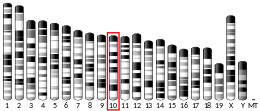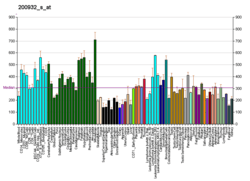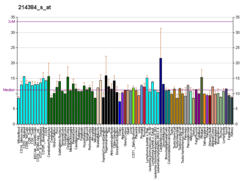DCTN2
Dynactin subunit 2 is a protein that in humans is encoded by the DCTN2 gene [4][5]
Function
This gene encodes a 50-kD subunit of dynactin, a macromolecular complex consisting of 23 subunits (11 individual proteins ranging in size from 22 to 150 kD).[6] The subunit is commonly referred to as p50 or dynamitin.[4] Dynactin binds to both microtubules and cytoplasmic dynein. It is involved in a diverse array of cellular functions, including ER-to-Golgi transport, the centripetal movement of lysosomes and endosomes, spindle formation, chromosome movement, nuclear positioning, and axonogenesis. This subunit is present in 4 copies per dynactin molecule. It contains three short alpha-helical coiled-coil domains that bind to two copies of p150-glued (DCTN1) and two copies of p24 (DCTN3) to form the dynactin shoulder domain.[6]
Interactions
DCTN2 has been shown to interact with MARCKSL1.[7]
References
- GRCm38: Ensembl release 89: ENSMUSG00000025410 - Ensembl, May 2017
- "Human PubMed Reference:". National Center for Biotechnology Information, U.S. National Library of Medicine.
- "Mouse PubMed Reference:". National Center for Biotechnology Information, U.S. National Library of Medicine.
- Echeverri CJ, Paschal BM, Vaughan KT, Vallee RB (February 1996). "Molecular characterization of the 50-kD subunit of dynactin reveals function for the complex in chromosome alignment and spindle organization during mitosis". The Journal of Cell Biology. 132 (4): 617–33. doi:10.1083/jcb.132.4.617. PMC 2199864. PMID 8647893.
- "Entrez Gene: DCTN2 dynactin 2 (p50)".
- Urnavicius L, Zhang K, Diamant AG, Motz C, Schlager MA, Yu M, Patel NA, Robinson CV, Carter AP (March 2015). "The structure of the dynactin complex and its interaction with dynein". Science. 347 (6229): 1441–1446. doi:10.1126/science.aaa4080. PMC 4413427. PMID 25814576.
- Yue L, Lu S, Garces J, Jin T, Li J (August 2000). "Protein kinase C-regulated dynamitin-macrophage-enriched myristoylated alanine-rice C kinase substrate interaction is involved in macrophage cell spreading". The Journal of Biological Chemistry. 275 (31): 23948–56. doi:10.1074/jbc.M001845200. PMID 10827182.
Further reading
- Maruyama K, Sugano S (January 1994). "Oligo-capping: a simple method to replace the cap structure of eukaryotic mRNAs with oligoribonucleotides". Gene. 138 (1–2): 171–4. doi:10.1016/0378-1119(94)90802-8. PMID 8125298.
- Suzuki Y, Yoshitomo-Nakagawa K, Maruyama K, Suyama A, Sugano S (October 1997). "Construction and characterization of a full length-enriched and a 5'-end-enriched cDNA library". Gene. 200 (1–2): 149–56. doi:10.1016/S0378-1119(97)00411-3. PMID 9373149.
- Starr DA, Williams BC, Hays TS, Goldberg ML (August 1998). "ZW10 helps recruit dynactin and dynein to the kinetochore". The Journal of Cell Biology. 142 (3): 763–74. doi:10.1083/jcb.142.3.763. PMC 2148168. PMID 9700164.
- Berrueta L, Tirnauer JS, Schuyler SC, Pellman D, Bierer BE (April 1999). "The APC-associated protein EB1 associates with components of the dynactin complex and cytoplasmic dynein intermediate chain". Current Biology. 9 (8): 425–8. doi:10.1016/S0960-9822(99)80190-0. PMID 10226031.
- Eckley DM, Gill SR, Melkonian KA, Bingham JB, Goodson HV, Heuser JE, Schroer TA (October 1999). "Analysis of dynactin subcomplexes reveals a novel actin-related protein associated with the arp1 minifilament pointed end". The Journal of Cell Biology. 147 (2): 307–20. doi:10.1083/jcb.147.2.307. PMC 2174220. PMID 10525537.
- Karki S, Tokito MK, Holzbaur EL (February 2000). "A dynactin subunit with a highly conserved cysteine-rich motif interacts directly with Arp1". The Journal of Biological Chemistry. 275 (7): 4834–9. doi:10.1074/jbc.275.7.4834. PMID 10671518.
- Merdes A, Heald R, Samejima K, Earnshaw WC, Cleveland DW (May 2000). "Formation of spindle poles by dynein/dynactin-dependent transport of NuMA". The Journal of Cell Biology. 149 (4): 851–62. doi:10.1083/jcb.149.4.851. PMC 2174573. PMID 10811826.
- Yue L, Lu S, Garces J, Jin T, Li J (August 2000). "Protein kinase C-regulated dynamitin-macrophage-enriched myristoylated alanine-rice C kinase substrate interaction is involved in macrophage cell spreading". The Journal of Biological Chemistry. 275 (31): 23948–56. doi:10.1074/jbc.M001845200. PMID 10827182.
- Vancoillie G, Lambert J, Haeghen YV, Westbroek W, Mulder A, Koerten HK, Mommaas AM, Van Oostveldt P, Naeyaert JM (December 2000). "Colocalization of dynactin subunits P150Glued and P50 with melanosomes in normal human melanocytes". Pigment Cell Research. 13 (6): 449–57. doi:10.1034/j.1600-0749.2000.130607.x. PMID 11153697.
- Hoogenraad CC, Akhmanova A, Howell SA, Dortland BR, De Zeeuw CI, Willemsen R, Visser P, Grosveld F, Galjart N (August 2001). "Mammalian Golgi-associated Bicaudal-D2 functions in the dynein-dynactin pathway by interacting with these complexes". The EMBO Journal. 20 (15): 4041–54. doi:10.1093/emboj/20.15.4041. PMC 149157. PMID 11483508.
- Short B, Preisinger C, Schaletzky J, Kopajtich R, Barr FA (October 2002). "The Rab6 GTPase regulates recruitment of the dynactin complex to Golgi membranes". Current Biology. 12 (20): 1792–5. doi:10.1016/S0960-9822(02)01221-6. PMID 12401177.
- Gevaert K, Goethals M, Martens L, Van Damme J, Staes A, Thomas GR, Vandekerckhove J (May 2003). "Exploring proteomes and analyzing protein processing by mass spectrometric identification of sorted N-terminal peptides". Nature Biotechnology. 21 (5): 566–9. doi:10.1038/nbt810. PMID 12665801.
- Uetake Y, Terada Y, Matuliene J, Kuriyama R (May 2004). "Interaction of Cep135 with a p50 dynactin subunit in mammalian centrosomes". Cell Motility and the Cytoskeleton. 58 (1): 53–66. doi:10.1002/cm.10175. PMID 14983524.
- Brill LM, Salomon AR, Ficarro SB, Mukherji M, Stettler-Gill M, Peters EC (May 2004). "Robust phosphoproteomic profiling of tyrosine phosphorylation sites from human T cells using immobilized metal affinity chromatography and tandem mass spectrometry". Analytical Chemistry. 76 (10): 2763–72. doi:10.1021/ac035352d. PMID 15144186.
- Ballif BA, Villén J, Beausoleil SA, Schwartz D, Gygi SP (November 2004). "Phosphoproteomic analysis of the developing mouse brain". Molecular & Cellular Proteomics. 3 (11): 1093–101. doi:10.1074/mcp.M400085-MCP200. PMID 15345747.
- Ficarro SB, Salomon AR, Brill LM, Mason DE, Stettler-Gill M, Brock A, Peters EC (2005). "Automated immobilized metal affinity chromatography/nano-liquid chromatography/electrospray ionization mass spectrometry platform for profiling protein phosphorylation sites". Rapid Communications in Mass Spectrometry. 19 (1): 57–71. doi:10.1002/rcm.1746. PMID 15570572.



